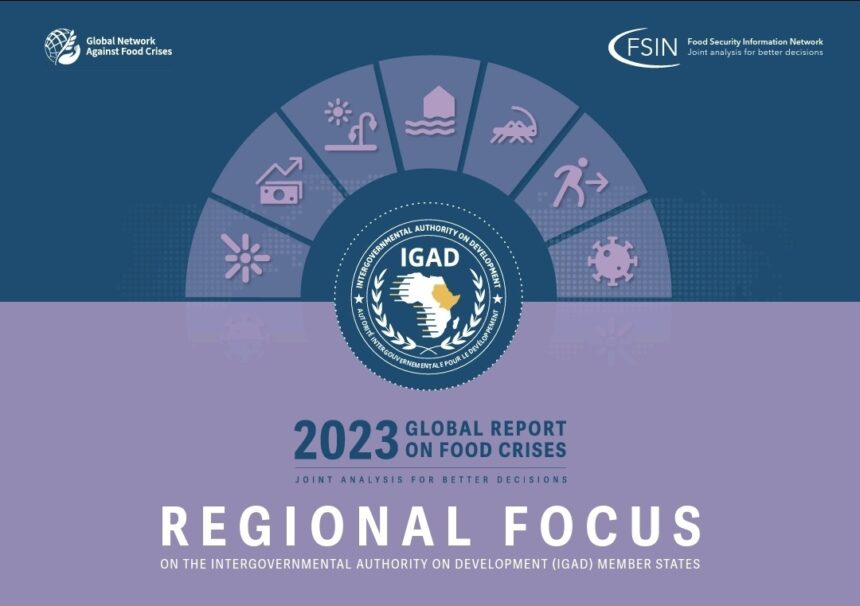Nairobi, Kenya – The Intergovernmental Authority on Development (IGAD) has released its fifth edition of the Global Report on Food Crises (GRFC) with a special focus on the region, shedding light on the severe food crisis that has plagued the IGAD member states. The report reveals a distressing reality: over 55 million people in the IGAD region faced acute food insecurity in 2022, marking a significant increase of over 13 million people from the previous year. The situation is predicted to worsen in 2023, with Kenya and Somalia being particularly affected.
According to the report, seven out of the eight IGAD member states, namely Djibouti, Ethiopia, Kenya, Somalia, South Sudan, Sudan, and Uganda, witnessed an alarming number of 55.45 million people requiring urgent food assistance. Unfortunately, no data was available for Eritrea. The report highlights the dire circumstances faced by 301,000 people who experienced a catastrophic level of hunger (IPC Phase 5) in 2022, with Somalia and South Sudan accounting for the majority of these cases.
The escalating food crisis can be attributed to various compounding factors, including three consecutive years of drought in the Horn of Africa, unprecedented flooding in South Sudan, prolonged conflicts, and macroeconomic challenges exacerbated by the ongoing impacts of COVID-19. The war in Ukraine has also played a role in exacerbating the situation. This dire combination of factors has led to spiraling consequences, affecting tens of millions of children, men, and women in the region.
Projections for 2023 paint a grim picture, with up to 30 million people across five countries, including Kenya, Somalia, South Sudan, Sudan, and Uganda, requiring humanitarian food assistance. Among them, an estimated 7.5 million people are expected to face large food consumption gaps and adopt emergency coping measures, while over 83,000 individuals are anticipated to face extreme food shortages in the most severely affected drought and conflict-ridden areas of the region, primarily in Somalia and South Sudan. It is crucial to note that these projections do not account for the recent clashes in Sudan, which will undoubtedly worsen the already dire food insecurity situation.
While the region awaits relief from the ongoing drought, the recovery of pastoral and agropastoral livelihoods will take years. Humanitarian assistance remains critical until households and communities can regain stability. Moreover, the conflict in Sudan has created a ripple effect, with hunger spreading to neighboring countries as hundreds of thousands of people flee their homes. This has further strained already alarming levels of food insecurity and malnutrition, stretching scarce humanitarian resources.
The IGAD Executive Secretary, Dr. Workneh Gebeyehu, emphasized that hunger levels in the region are at an unprecedented high. He highlighted the interconnectedness of climate extremes, conflicts, and economic shocks, which exacerbate the suffering of millions. To address this crisis, he called for a paradigm shift, stressing the need to build resilience against future shocks and transform agrisystems to be more efficient, inclusive, and sustainable. Dr. Gebeyehu also emphasized the critical link between conflict and food insecurity and the necessity of sustained peace-building efforts.
Dr. Chimimba David Phiri, the FAO’s Subregional Coordinator for Eastern Africa and Representative to the African Union and the United Nations Economic Commission for Africa, echoed the urgency of the situation. He called for immediate and collective action to address the root causes of food insecurity. Dr. Phiri emphasized the need for anticipatory action and climate adaptation strategies to prevent future climate emergencies. He also stressed the importance of efforts to sustainably build peace, increase domestic production, and reduce post-harvest losses in the IGAD region.
Addressing the dire food crises in the IGAD region requires urgent and coordinated efforts from international organizations, governments, the private sector, regional organizations, civil society, and communities. It is imperative for all actors to align their efforts and share evidence and information beyond immediate relief measures. Long-term strategies are needed to achieve sustainable food security in the region.
The IGAD report serves as a wake-up call for immediate action to alleviate the suffering of millions of people affected by acute food insecurity. In response to this crisis, the Somali National News Agency highlights the following key points:
• Alarming Food Insecurity: The IGAD region is facing an unprecedented food crisis, with over 55 million people in need of urgent food assistance. This represents an increase of over 13 million people compared to the previous year.
• Worsening Situation: Projections for 2023 indicate a further deterioration of the food crisis, particularly in Kenya and Somalia. Up to 30 million people across five countries are expected to require humanitarian food assistance.
• Root Causes: The food crisis is a result of multiple compounding factors, including prolonged drought, severe flooding, conflicts, and economic challenges exacerbated by the COVID-19 pandemic and the war in Ukraine.
• Catastrophic Consequences: The report highlights the devastating reality faced by hundreds of thousands of people experiencing extreme levels of hunger, particularly in Somalia and South Sudan.
• Call for Action: The IGAD Executive Secretary emphasizes the urgent need for a paradigm shift in addressing the crisis. Building resilience, transforming agrisystems, and sustaining peace are crucial steps towards achieving sustainable food security.
• Anticipatory Action: The FAO’s Subregional Coordinator for Eastern Africa calls for immediate and collective action to address the root causes of food insecurity. Anticipatory action and climate adaptation strategies are vital to prevent future climate emergencies.
• Coordinated Efforts: International organizations, governments, the private sector, regional organizations, civil society, and communities must work together to alleviate the suffering caused by the food crisis. Immediate relief measures should be coupled with long-term strategies for sustainable food security.
The Somali National News Agency urges all stakeholders to heed the warnings presented in the IGAD report and take immediate action to address the escalating food crisis. It is essential to prioritize the well-being of millions of vulnerable people in the region, provide necessary humanitarian assistance, and implement long-term solutions to achieve sustainable food security for all.
Note: The data and findings mentioned in this article are sourced from the IGAD Regional Focus of the Global Report on Food Crises (GRFC) 2023.





